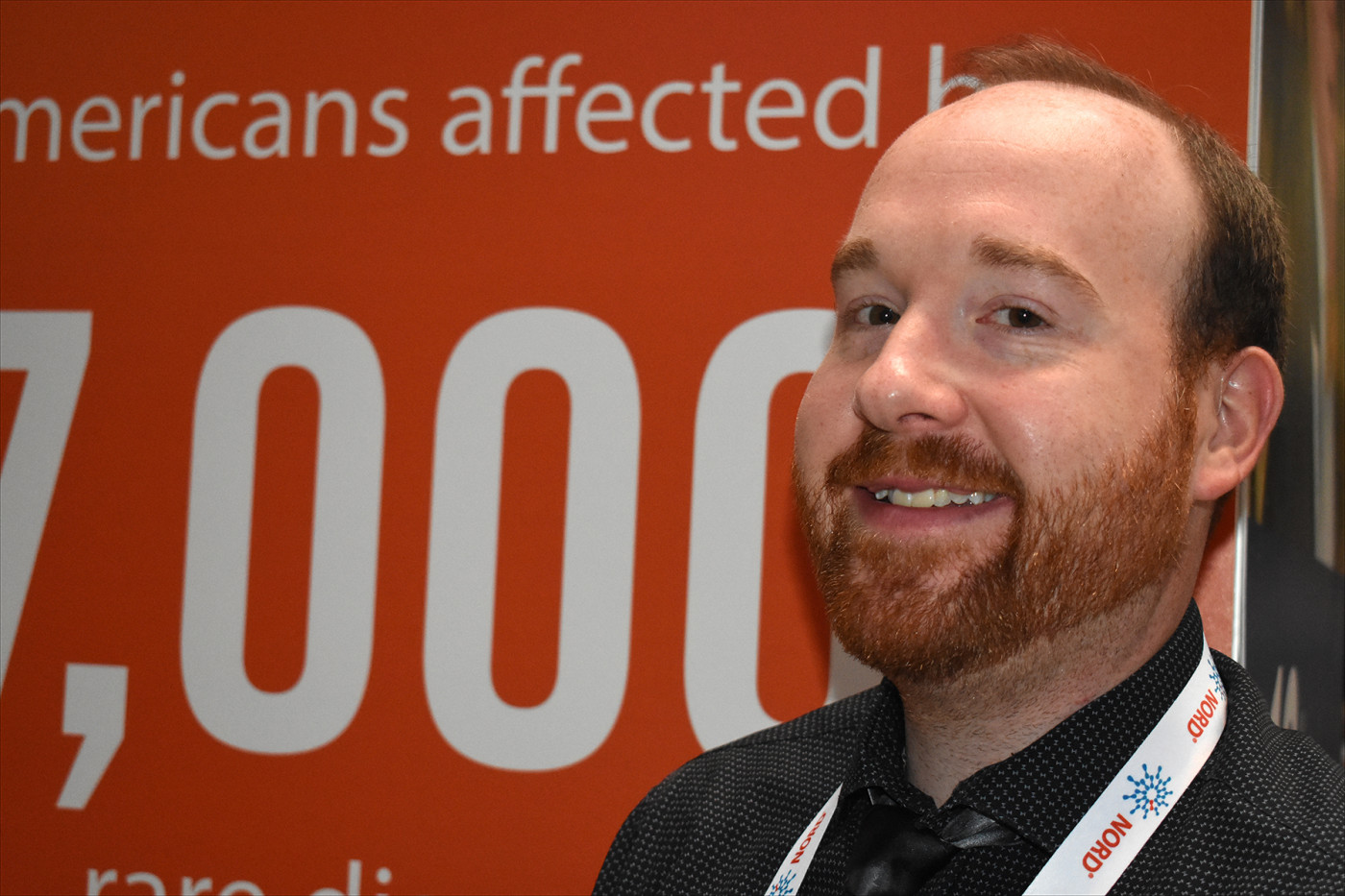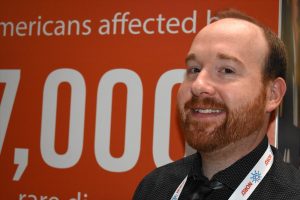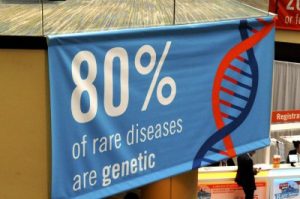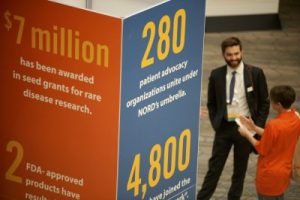NY Kidney Recipient Becomes Spokesman for Alport Syndrome Foundation

Kevin Schnurr, the Alport Syndrome Foundation’s new director of communications. (Photo by Larry Luxner)
Until he was diagnosed at age 26, Kevin Schnurr had no idea what Alport syndrome was. And even though the worst is now behind him — thanks to a kidney transplant that saved his life — the ultra-rare genetic condition still defines his life and his career.
Schnurr, 33, is director of communications and patient engagement at the Alport Syndrome Foundation (ASF). The nonprofit group, which maintained a rather low profile in recent years, has been energized by encouraging Phase 3 results for bardoxolone methyl, an investigational therapy developed by Reata Pharmaceuticals to preserve and improve kidney function in Alport patients.
Reata said the 157 patients in its CARDINAL trial (NCT03019185) showed improved kidney function after taking bardoxolone for nearly a year — and sustained those improvements even after quitting the treatment for four weeks.
ASF Executive Director Lisa Bonebrake, who’s based in San Diego, called the results “very promising.” Bardoxolone, she said in a Nov. 11 press release, “provides hope to the entire Alport community that we could finally have the first therapy to treat this rare, genetic kidney disease.”
Bonebrake added: “The Alport Syndrome Foundation is grateful to the patients who participated in this study. Their willingness to contribute to our understanding of bardoxolone is a gift to all patients facing the devastating impact that Alport syndrome can have on their lives, others with the disease in their family, and those who care about them.”
Schnurr knows about that “devastating impact” all too well.
Seven years ago, Schnurr — a resident of the Long Island town of Nesconset — was working as a graphic designer at a biomedical firm. The then-26-year-old had no medical coverage, having just been bumped off his parents’ insurance plan.
Schnurr realized something was wrong when he began feeling nauseous for no apparent reason.
“I was having a hard time keeping food down and felt fatigued all the time — getting a full nights’ rest but not feeling rested,” he told Alport Syndrome News during the recent NORD Rare Diseases & Orphan Products Breakthrough Summit in Washington, D.C. “And I had a ringing in my ears. I thought maybe I had an ear infection or the flu, but the ringing was enough to get me to an urgent-care clinic.”
At the clinic, a doctor shined a flashlight into his eyes, while a nurse took his blood pressure and found it to be dangerously high.
“They gave me a blood pressure pill and said they’d wait 20 minutes to see if it went down,” he recalled. “I sat there and it went up — to 240/120. They told me I had no choice but to immediately go to a hospital.”
Schnurr ended up at nearby Stony Brook University Hospital, though he was not allowed to drive there by himself. Doctors there informed him that had he been overweight, he would have probably suffered a heart attack.
The gift of a lifetime
In fact, within a few hours of being admitted, he had to go on emergency dialysis.
“My potassium level was so high, they were afraid I could have a heart attack at any minute. So their biggest priority was to lower my potassium and stabilize the blood pressure. To do both of those things, there was no choice but to start immediate dialysis,” he said, recalling with a grimace how doctors did hemodialysis via a groin cathether and, later, a chest catheter.
“At the hospital, they did blood work, which clearly indicated that I was in kidney failure,” he said; that surprised Schnurr, since he had never had a problem urinating. “I subsequently had to have a kidney biopsy. We ended up doing two biopsies, because the first attempt to retrieve kidney tissue was unsuccessful.”
That first week at Stony Brook, Schnurr underwent dialysis four times — each session lasting three and a half hours. Then, after two weeks of uncertainty and nowhere to go, Schnurr finally got the verdict: Alport syndrome.
“I had certainly never heard of it before, but it gave me some sense of closure,” he said. “At that point, my biggest effort was trying to get Medicare taken care of so I could go home.”
During his entire three months in the hospital, he was allowed to leave only once — to visit a nearby state social services office to take care of paperwork.
“People brought me books. I watched all of Breaking Bad on Netflix,” he said. “I also googled the Alport Syndrome Foundation and called their phone number. The person who answered was Sharon Lagas, president and co-founder of the ASF. I told her I had just been diagnosed with the disease. She made me not feel alone anymore.”
Ninety days after being admitted, Schnurr finally left the hospital and continued peritoneal dialysis treatments at home — 10 hours every night for two years. He followed a strict diet and took seven pills with every meal.
“Naturally, the dialysis team talked about a transplant and they were very helpful in putting me on the national waiting list, which I qualified for,” he said. “But they told me my wait for a kidney would be five to seven years.”
Discouraged, Schurr started telling everyone he knew about his search for a kidney — without which his condition would continue deteriorating. He spread the word on Facebook and told his story to media outlets ranging from Newsday to Long Island’s TV News 12 to USA Today.
“I’m an only child, and both of my parents were disqualified, since my mom had passed along the condition to me, and my father had had skin cancer lesions,” he said.
Ultimately, Matthew Threadgill — Schnurr’s best friend — offered to donate one of his two kidneys. “I vividly remember sitting in my room one night, and getting that life-changing call from Matthew,” he said. “It was the best news ever.”
‘A cause close to my heart’
Following a testing and matching process that took six months, the two men were cleared for the operation. Schnurr received his new kidney on May 6, 2014 — but doctors decided not to take his shrunken old ones out.
“My kidneys are now basically scar tissue,” he said. “It was safer just to leave them in than risk taking them out — so I have three kidneys, but only one works.”
Despite the kidney transplant, Schnurr still has Alport syndrome and has suffered progressive hearing loss. As a result, he had to buy his first pair of hearing aids in 2016.
Schnurr has X-linked Alport syndrome (XLAS), which is caused by a mutation in the COL4A5 gene. That gene, located on the X chromosome, encodes one of the components of a structural protein called type 4 collagen. This form — which accounts for about 80% of all diagnosed Alport cases — is more likely to aggressively affect men than women, because men have only one X chromosome. Even so, X-linked women must be regularly monitored as they can also develop renal failure.
Unfortunately, 70% of those with XLAS reach end-stage kidney disease by age 30, and 90% by age 40. Female XLAS patients with just one affected gene may develop the disease more slowly compared to their male counterparts, with end-stage kidney disease potentially occurring later in life. Significantly, females with hematuria, or blood in the urine, are not “carriers” as often mistakenly believed; they are patients and must be monitored and treated.
The other two forms of the disease are autosomal recessive Alport syndrome (ARAS), which accounts for 15% of all Alport cases and affects males and females equally, and autosomal dominant Alport syndrome (ADAS) — the rarest form — which accounts for the remaining 5% of cases.
Because so many Alport patients are either undiagnosed or misdiagnosed, it’s hard to know the total number of people with the disease. Schnurr said it affects 1 in 5,000 to 10,000 births, translating into anywhere from 30,000 to 60,000 U.S. cases.
The ordeal eventually led Schnurr to dedicate his professional life to curing Alport syndrome. He gave up his job at Farmingdale State College to work full-time at ASF because, he said, “it’s a cause close to my heart.”
Yet Schnurr, a music fanatic, never let the disease stop him from enjoying concerts.
“During the two years I was on dialysis, I traveled a lot. I would take my dialysis machine in my car and go to concerts in Pennsylvania,” he said. “A lot of patients are intimidated by traveling while on dialysis because it’s a lot of work, but I didn’t want to let dialysis run my life.”
Some 4,400 people now follow the Alport Syndrome Foundation on Facebook, which the charity uses as its main source of communication. However, it does plan to relaunch its long-dormant website by the end of 2019. The nonprofit is also one of about 280 patient advocacy groups under the umbrella of NORD, the National Organization for Rare Disorders.
“Our job is to raise awareness. We’re still learning about new mutations of the disease every day, which is why it’s more important than ever to promote research,” Schnurr said, adding that for many years, it was believed Alport affected only males. “Now we know that men and women are equally affected. The disease may progress differently, but everyone needs to be aware of it.”










Leave a comment
Fill in the required fields to post. Your email address will not be published.